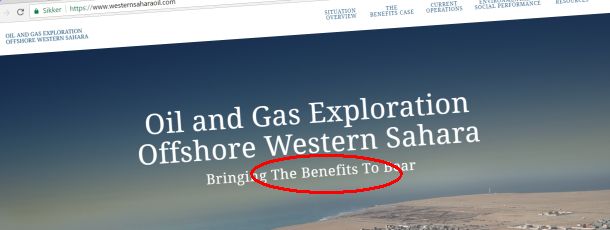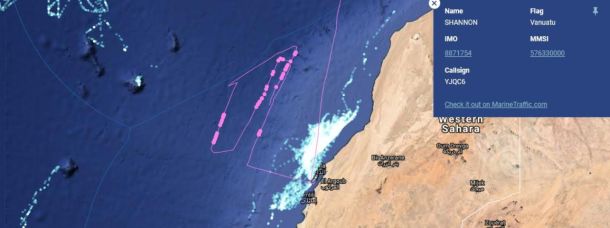
"WSRW believes it is time for the Saharawi people to settle the question of how they wish to be governed through the referendum which the UN calls for. Then it will be clear to companies with whom to deal", writes WSRW in letters to the editor in the petroleum journals Upstream and Petroleum Africa.
[Photo: www.berserk-productions.no]
Saharawi must decide on Western Sahara
By Cate Lewis
International Coordinator, Western Sahara Resource Watch
Letter to the editor
Upstream, 20 February 2009
Download in pdf here.
UPSTREAM’S coverage of Moroccan oil exploration in Western Sahara points out the dilemma that it is
a territory which is treated by the United Nations as an unresolved colonial issue, and an area under occupation.
In the 30 January edition of Upstream, Calvin Dark of the US-based Moroccan lobby bureau Moroccan American Center for Policy, in seeking to correct some “false and misleading statements” in your coverage, unfortunately makes a series of errors of his own.
Dark claims that the UN considers Morocco as Administrative Authority over Western Sahara, and that the Moroccan oil search in Western Sahara is legal since it is to the benefit of the people of the territory. His arguments are taken out of thin air.
Western Sahara Resource Watch, representing individuals and organisations in 30 countries, would like to clarify a few aspects of Dark’s interpretation of international law.
• No state in the world recognises Morocco’s claim to Western Sahara, a claim which is found groundless
by the International Court of Justice. The UN condemned the 1975 Moroccan annexation of Western
Sahara.
• Morocco is not recognised as the Administering Power of the territory. This was clearly confirmed by the UN legal office, in its much referred to 29 January 2002 Legal Opinion, paragrap 6. No agreement has ever legally transferred the administration of Western Sahara from Spain to Morocco, according to the UN.
• Had Morocco been the Administering Authority of Western Sahara, certain regulations would apply,
such as not carrying out natural resource exploration or exploitation unless it is respecting the wishes and interests of the people of the territory. But considering Morocco is not the Administering Power,
as the author of the UN legal opinion, Hans Corell, has repeated, even stronger rules must be considered as to when natural resources activity can be considered legal.
“Any limitation of the powers of such entity acting in good faith would certainly apply a fortiori to an entity that did not qualify as an administering power but de facto administered the Territory”, Corell said recently.
• It is not for Morocco to decide what is of the Saharawi people’s benefit. According to the UN, the exploitation of natural resources can only take place if it is in accordance with the “wishes and interests” of the people in the territory.
Only the people in Western Sahara can decide this, not Morocco. Despite more than 100 UN resolutions calling for the Saharawis’ right to selfdetermination, this right has still not been respected.
Western Sahara Resource Watch (WSRW) works to preserve the natural resources of Western Sahara
for the Saharawi people. These people are simply asking to exercise their inalienable right to selfdetermination endorsed by the United Nations. WSRW believes it is time for the Saharawi people to settle the question of how they wish to be governed through the referendum which the UN calls for. Then it will be clear to companies with whom to deal.
Petroleum Africa
11 February 2009
WSRW Weighs in on Western Sahara Exploration Debate
Petroleum Africa has received many comments on recent reports published on www.petroleumafrica .com and in the February issue of the magazine regarding the exploration taking place off the coast of Western Sahara initiated by Kosmos Energy under an agreement with Morocco (see http://www.petroleumafrica.com/read_article.php?NID=7014). We have, in an effort to be fair to all, published each organizations’ perspective on the issue.
Recently, Petroleum Africa was contacted by Catherine Lewis, International Coordinator for Western Sahara Resource Watch (WSRW). Lewis offered the WSRW’s perspective on the statement issued to Petroleum Africa by Calvin Darks, Director of Communications for US based Moroccan lobby bureau the Moroccan American Center for Policy.
The clarification and position of the WSRW as received by Ms. Lewis follows:
11 February 2009
Petroleum Africa
Dear Editor
Petroleum Africa has written a series of good articles in recent weeks regarding the case of Moroccan oil exploration in Western Sahara. The dilemma as written by Petroleum Africa, is that Morocco is exploring for oil in a territory, which is treated by the UN as an unresolved colonial issue, and is an area under occupation.
Mr. Calvin Dark, Director of Communications of the US based Moroccan lobby bureau Moroccan American Center for Policy, in seeking to correct some "false and misleading statements" in your coverage, presented an opinion to Petroleum Africa which was published on 24 January, unfortunately makes a series of errors of his own (see article).
Western Sahara Resource Watch, representing individuals and organisations in 30 countries, would like to clarify a few aspects of Mr. Dark’s interpretation of international law.
Most gravely, Mr. Dark makes a serious mistake in suggesting that Western Sahara is part of Morocco. No state in the world, nor the UN, recognise Western Sahara as Moroccan. The 1975 Madrid treaty between Morocco and its neighbouring countries has never been recognised by the UN. On the other side, the 1975 Moroccan annexation of Western Sahara was condemned by the UN.
Morocco has furthermore never been recognised as Administrative Authority of the territory, as Mr. Dark suggests. It is all the more curious that he should state this, given that he himself quotes a legal opinion made by the former UN Under-Secretary General for Legal Affairs, Mr. Hans Corell of 2002. In the opinion’s section 6, it is stated that: "The Madrid Agreement did not transfer sovereignty over the territory, nor did it confer upon any of the signatories the status of an administering Power - a status which Spain alone could not have unilaterally transferred." How is it possible for Dark to claim that this means the "United Nations, which recognised the validity of the Madrid Treaty, also recognises Morocco as the Administering Authority in Western Sahara"?
If this premise doesn't hold, the rest of the argument falls. Morocco may be the de facto administrator in Western Sahara, but the claim by Polisario that its occupation is illegal is given a footing. Corell continues, "Morocco however, is not listed as the administering Power of the territory in the United Nations list of Non-Self-Governing Territories" (section 7)
Had Morocco indeed been the administering power of Western Sahara, certain regulations would apply, such as the fact that it does not carry out natural resource exploitation/ exploitation unless it is respecting the wishes and interests of the people of the territory. But considering Morocco is not the administering power, as Corell has repeated, even stronger rules must be considered as to when natural resources activity can be considered legal.
"Any limitation of the powers of such entity acting in good faith would certainly apply a fortiori to an entity that did not qualify as an administering Power but de facto administered the Territory," Corell stated in a conference in South Africa in December 2008: click here for statement.
Mr. Dark states that “The Polisario has taken out of context and manipulated the full findings of the 2002 advisory opinion of the UN's Legal Affairs Division, which explains the extent to which Morocco is authorised to undertake such developments and conditions governing use of any resulting benefits.” In this one sentence, Mr. Dark has omitted the most important aspect of the entire Western Sahara conflict, and the main conclusion of the 2002 opinion. It is not for Morocco to decide what is of the people’s benefit. The whole conclusion of the Corell opinion is that this can only take place if it is accordance with the “wishes and interests” of the people in the territory. The issue is thus self-determination for the people in the territory. More than 100 UN resolutions support this right for self-determination the Sahrawi people. This applies for the territory’s resources as much as for the territory.
Here, one can be assured that the opinion Dark attributes to the Polisario alone, is in fact shared by the community of international lawyers and academics as well as United Nations bodies. It is actually Morocco which is alone in its special pleading.
The International Court of Justice found in 1975 that Morocco never had any sovereignty over Western Sahara and that its people were entitled to the right of self-determination. The UN General Assembly resolution of 1979 (34/37) refer to the Polisario as the legitimate representative of the Saharawi people and resolution (35/19) of 1980 described Morocco's presence in Western Sahara as an "occupation". In any case its de facto administration covers only the part of the country west of the military wall or berm which divides the territory held by Morocco from that held by the Polisario Front.
The Polisario Front, by the way, is recognised by the United Nations as the proper representative of the Saharawi people (on both sides of the berm) in the current peace talks with Morocco. The Saharawi Republic is a full member of the African Union and recognised by many countries around the world. It has a democratic constitution and elects its president and government at a national congress every 4 years. Morocco, by contrast, is ruled by an absolute monarch who appoints the prime minister and has the power to dismiss any member of the government or parliament. If Western Sahara’s president has led his country for over 30 years, it is because he has been re-elected many times by his people. The change of the Moroccan head of state during that period occurred not by a vote but through the traditional rules of succession following the death of King Hassan II in July 1999.
Western Sahara Resource Watch works to preserve the natural resources of Western Sahara for the Saharawi people. These people are simply asking to exercise their inalienable right to self-determination endorsed by the United Nations. WSRW believes it is time for the Saharawi people to settle, through a referendum, the question of how they wish to be governed. Then it will be clear to companies with whom to deal.
Yours sincerely
Cate Lewis
Kosmos Energy maintains propaganda site after Western Sahara exit
Kosmos Energy has decided to keep their website defending Western Sahara oil search - even after they have left the territory.
Studies continue on Kosmos Energy's block
Is Kosmos Energy undertaking a last survey on the Boujdour Maritime licence before it waves goodbye to occupied Western Sahara? Or has an unknown company taken over the licence? Last week, seabed petroleum surveys started at the place where Kosmos drilled in 2014.
Kosmos and Cairn have pulled out of Western Sahara
17 years of US private company engagement in exploring the oil potential of Western Sahara has come to an end.
Kosmos surveying oil potential near Dakhla again?
Over the past 24 hours, WSRW has observed a resumed seabed exploration north of Dakhla, in the block operated by American oil company Kosmos Energy in collaboration with Scotland's Cairn Energy.



